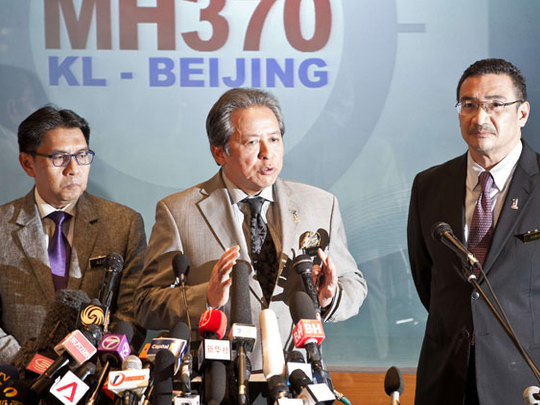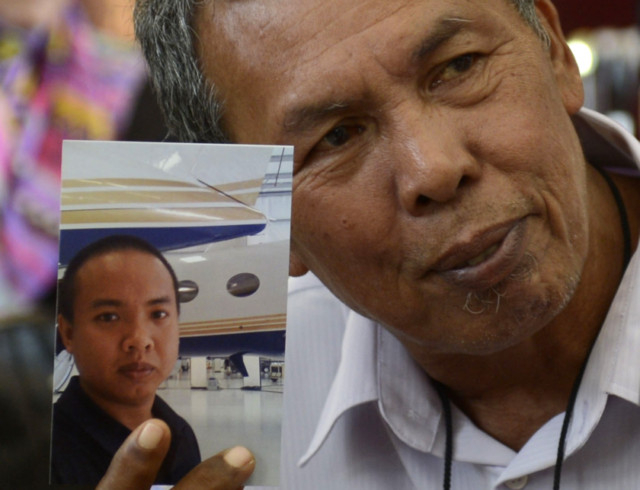
Relatives of some of the Chinese passengers on the missing Malaysia Airlines flight MH370 have threatened to go on hunger strike in an effort to force more information from the Malaysian authorities.
"Now we have no news, and everyone is understandably worried," said Wen Wanchen, whose son is among the 239 people on board.
"The relatives say they will go to the [Malaysian] embassy to find the ambassador. The Malaysian ambassador should be presenting himself here. But he's not. Relatives are very unsatisfied. So you hear them saying 'hunger strike'," he told Agence France-Presse.
China said on Tuesday that it had deployed 21 satellites to search for the missing airliner. It was already searching those parts of its territory covered by a northern corridor that the aircraft could have flown through, state media said.
Australian and Indonesian authorities were leading the search along the plane's southern flight corridor. Australian officials scouring a 600,000sq km area of the Indian Ocean have described the effort as "not just a needle in a haystack, it's a haystack that gets bigger and shifts". China has adjusted its search along the norther corridor away from the South China Sea.
The Chinese ambassador in Kuala Lumpur said on Tuesday that authorities were conducting extensive checks on all Chinese passengers on board the missing jet but had found no evidence they were involved in any deliberate diversion of the plane.
More than 150 Chinese nationals were among the 239 people on Beijing-bound flight MH370 when it disappeared early on 8 March.
Investigators believe it was diverted deliberately and are investigating the background of the crew, ground staff and passengers. They have not ruled out hijacking, sabotage, terrorism or issues related to personal or psychological problems.
China "conducted meticulous investigation into all the [Chinese] passengers, and did not find any evidence for sabotage activity", Huang said at a press briefing that was reported by the South China Morning Post.
Malaysia's opposition leader, Anwar Ibrahim, has confirmed that he is related to the captain of the MH370, Zaharie Ahmad Shah.
"I am not denying that he [Zaharie] is related to one of my in-laws and that I have met him on several occasions," Anwar told reporters on Tuesday. "In fact, he is a close friend of [PKR supreme council member and Subang MP] R Sivarasa, as we said before."
China's Xinhau state news agency has reported that the country's premier, Li Keqiang, rang the Malaysian prime minister, Najib Razak, on Monday asking him to provide Beijing with more detailed data and information in a timely, accurate and comprehensive manner. He said that, despite the difficulty of the search, "as long as there is still a gleam of hope we should continue to do our utmost".
Malaysia, US row amid search and confusion
Malaysia's top official in charge of the search for a missing jetliner rejected criticism on Tuesday from US officials that it has not been sharing as much information as it could with foreign governments.
A Malaysia Airlines Boeing 777-200ER vanished en route from Kuala Lumpur to Beijing in the early hours of March 8 with 239 passengers and crew on board. No trace of the plane has been found.
China has called for better coordination in the search operation now involving 26 countries, while some U.S. officials and politicians have expressed frustration at what they see as Malaysia's refusal of help.
Malaysian Defence Minister Hishammuddin Hussein specifically defended coordination with the United States and China and said he had been in touch with his counterparts in both countries.
"This morning, I was (speaking) with (U.S. Defense Secretary) Chuck Hagel and then I was also with my counterpart (from) China," he told Reuters.
Hishammuddin denied reports that Malaysia had discouraged the Federal Bureau of Investigation from sending a team to Malaysia.
"I have been working with them. It's up to the FBI to tell us if they need more experts to help because it's not for us to know what they have." Malaysian officials say they have been in touch with the FBI through the U.S. embassy, where the agency has a permanent representative, from "day one".
"No matter what everyone says, the cooperation that I am getting for Malaysia and for what efforts I am doing, it is overwhelming," Hishammuddin said.
Two U.S. security officials said on Monday that Malaysia had still not invited the FBI to send a team.
One source in Kuala Lumpur familiar with the investigation said an FBI team was in Malaysia to help with the probe. But another source familiar with the matter confirmed that no one had arrived from the United States to reinforce the FBI presence in the country.
An unprecedented search for the missing flight now stretches across Asia, from the Caspian Sea to the southern Indian Ocean.
Investigators are convinced that someone with deep knowledge of the Boeing 777-200ER and commercial navigation diverted the jet, carrying 227 passengers and 12 crew, perhaps thousands of miles off course.
'Someone with deep knowledge diverted it'
KUALA LUMPUR: Intensive background checks of everyone aboard a missing Malaysian jetliner have so far failed to find anyone with a known political or criminal motive to crash or hijack the plane, Western security sources and Chinese authorities said.
Malaysia said it had conferred with the U.S. and Chinese ministers on the search for Malaysian Airlines Flight MH370, an unprecedented 26-nation operation that now spans Asia from the Caspian Sea to the southern Indian Ocean.
Investigators are convinced that someone with deep knowledge of the Boeing 777-200ER and commercial navigation diverted the jet, carrying 12 crew and 227 mainly Chinese passengers, perhaps thousands of miles off course.
China's ambassador to Malaysia said the country had carried out a detailed probe into its nationals aboard the flight, which vanished on March 8, and could rule out their involvement.
"The probe into the incident's cause is not suitable to be conducted in a high-profile way," Ambassador Huang Huikang told Chinese reporters, state television said on one of its official microblogs on Tuesday.
U.S. and European security sources said efforts by various governments to investigate the backgrounds of everyone on the flight had not, as of Monday, turned up links to militant groups or anything else that could explain the jet's disappearance.
A European diplomat in Kuala Lumpur also said trawls through the passenger manifest had come up blank.
Search for missing plane expands to Kazakhstan
Kuala Lumpur: The search for the missing Malaysian jet pushed deep into the northern and southern hemispheres on Monday as Australia took the lead in scouring the seas of the southern Indian Ocean and Kazakhstan — about 10,000 miles to the northwest — answered Malaysia’s call for help in the unprecedented hunt.
French investigators arriving to lend expertise from the two-year search for an Air France jet that crashed into the Atlantic Ocean in 2009 said they were able to rely on distress signals — but investigators say the Malaysian airliner’s communications links were deliberately severed ahead of its mysterious disappearance more than a week ago.
“It’s very different from the Air France case. The Malaysian situation is much more difficult,” Jean Paul Troadec, a special adviser to France’s aviation accident investigation bureau, said in Kuala Lumpur.
The co-pilot of a missing Malaysian jetliner spoke the last words heard from the cockpit, the airline’s chief executive said on Monday, as investigators consider suicide by the captain or first officer as one possible explanation for the disappearance.
No trace of Malaysia Airlines Flight MH370 has been found since it vanished on March 8 with 239 people aboard.
Investigators are increasingly convinced it was diverted perhaps thousands of miles off course by someone with deep knowledge of the Boeing 777-200ER and commercial navigation.
A search unprecedented in its scale is now under way for the plane, covering an area stretching from the shores of the Caspian Sea in the north to deep in the southern Indian Ocean.
Airline chief executive Ahmad Jauhari Yahya also told a news conference that it was unclear exactly when one of the plane’s automatic tracking systems had been disabled, appearing to contradict the weekend comments of government ministers.
Suspicions of hijacking or sabotage had hardened further when officials said on Sunday that the last radio message from the plane — an informal “all right, good night” — was spoken after the system, known as “ACARS”, was shut down.
“Initial investigations indicate it was the co-pilot who basically spoke the last time it was recorded on tape,” Ahmad Jauhari said on Monday, when asked who it was believed had spoken those words.
That was a sign-off to air traffic controllers at 1.19 am, as the Beijing-bound plane left Malaysian airspace.
The last transmission from the ACARS system — a maintenance computer that relays data on the plane’s status — had been received at 1.07 am, as the plane crossed Malaysia’s northeast coast and headed out over the Gulf of Thailand.
“We don’t know when the ACARS was switched off after that,” Ahmad Jauhari said. “It was supposed to transmit 30 minutes from there, but that transmission did not come through.”
Malaysia’s government in the meantime sent out diplomatic cables to all countries in the search area, seeking their help with the search, as well as to ask for any radar data that might help narrow the task. Some 26 countries are involved in the search, which initially focused on seas on either side of peninsular Malaysia, in the South China Sea and the Strait of Malacca.
Over the weekend, however, Malaysian Prime Minister Najeeb Razak announced that investigators determined that a satellite picked up a faint signal from the aircraft about seven hours after takeoff. The signal indicated that the plane would have been somewhere on a vast arc stretching from Kazakhstan down to the southern reaches of the Indian Ocean.
Had the plane gone northwest to Central Asia, it would have crossed over countries with busy airspace, and some experts believe the person in control of the aircraft would more likely have chosen to go south. However, authorities are not ruling out the northern corridor and are eager for radar data that might confirm or rule out that path.
The northern search corridor crosses through countries including China, India and Pakistan — all of which have indicated they have seen no sign of the plane so far.
Relatives of Chinese passengers aboard the missing plane voiced fury on Monday, accusing the Malaysian government of “talking nonsense” and launching a cover-up while a rescue could have been carried out.
“Only the Malaysia government knows the truth. They’ve been talking nonsense since the beginning,” said Wen Wancheng, following a meeting with airline officials in Beijing as the search entered its 10th day.
“You hid the whereabouts from the beginning and after seven to eight days you discovered it? That was the best time to launch a rescue,” added the 63-year-old from the eastern province of Shandong, whose son was aboard the missing jet.
Another relative who left the meeting told AFP: “Of course there is no useful information for us, there never is.”
The relatives’ anger came as Malaysia drew more scathing criticism from Chinese state media and social media users.
Malaysian prime minister on Saturday disclosed that the flight had been deliberately diverted, and that the plane flew for several hours after leaving its intended flight path.














